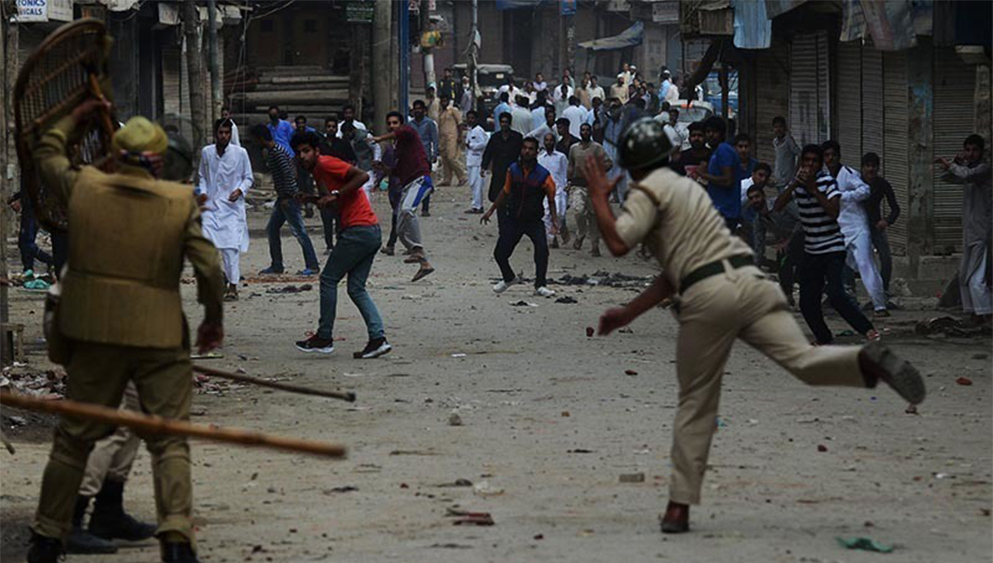 CPSD - Commentary
CPSD - Commentary
Conflict in Indian Occupied Kashmir and the Rise of The Far Right in India: A Codependent Relationship
Atrocities committed in Indian-occupied Kashmir are not given enough coverage in international media. However, there are periods of escalating tension and violence that direct attention to the constant oppression of Kashmiris. These news cycles dissipate quickly, as the sensational Indian media propagates the message that it is eradicating terrorism in Kashmir. This point of view is now widely accepted within India in the context of the rise of the Far Right in Indian politics. This shift has been characterized by hyper-nationalism and a burgeoning discriminatory violence against Kashmiris.
Kashmir has been in the limelight lately due to the killings of Kashmir University professors, Saddam Padder and Muhammad Rafi Bhat in Shopian and the brutal rape of a child named Asifa by an Indian police officer in the district of Kathua. These events have led to an uproar in India, with some rightly appalled by the events unfolding in Kashmir. However, a large portion of the Indian population also came forward in support of the actions taken by their armed forces. This illustrates a concerning shift in the attitudes of the Indian population – a country that has historically maintained a strong secularist outlook since the Bharatiya Janata Party (BJP) took power. The current dynamics of the Kashmir issue are inherently linked to the BJP’s brand of politics and thus hyper nationalism is used as a tactic to control one of the largest countries in the world.
The last time Kashmir gained the world’s attention was in July 2016 when the Indian forces martyred Burhan Wani – an influential figure and commander of the resistance movement, Hizbul Mujahideen. Wani’s killing was perhaps where the dissonance between the Indian media’s narrative and the on-ground reality of Kashmir was most visible. While New Delhi designated him a terrorist, Wani’s funeral saw at least 200,000 people out on the streets of Kashmir which led to militarized action by the Indian forces. More than a hundred people were martyred in the aftermath of Wani’s funeral from 2016-18. This shows that there are very visible grievances of the Kashmiri people due to a systemic oppression of their rights. These legitimate demands are neatly swept under the carpet by labelling any resistance as terrorism. These grievances are out in full force again, that can be witnessed in Shopian now. This is an area that has been in a state of conflict since the killing of six civilians in March 2018, who were labelled as terrorists by the Indian authorities.
This time five people have been killed including Saddam Padder, a professor from Kashmir University. While videos of his funeral and a tribute from his mother have spread like wildfire on social media – there is also a narrative being constructed where Padder is being identified solely as a radical militant by the Indian media. There have been outright statements of support for a Kashmiri genocide by Indian journalists all in the name of national security. This metamorphosis of India from presenting a secular pluralist image to the world to being a purveyor of Hindutva ideology fits perfectly with the global resurgence of far-right movements.
Kashmir is a nuclear flashpoint of South Asia – any trigger would lead to a disastrous spillover of conflict and chaos in the entire region therefore, the issue of Kashmir must be dealt with sensibly. The Indian army’s actions are a blatant violation of human rights therefore the international community must condemn it in the strongest terms. Pakistan should raise the issue on relevant forums to pressurize India on the diplomatic front. The Indian government should not use the Kashmir conflict to push forward its own agenda of gaining power and perpetuating its far right ideology.
An impartial and recognized international governing body such as the United Nations (UN) must put pressure on India to hold an impartial plebiscite in Kashmir. There must be a genuine attempt to move forward towards resolution rather than allowing regional peace and prosperity to be jeopardized at the expense of Indian aggressive posturing. Other nuclear powers in the region such as Russia and China should also be lobbied by Pakistan to pressurize India into accepting Kashmiri demands.
The most important strategy for Pakistan however is to fortify its diplomatic standing and urge international bodies to pressurize India through diplomatic tactics. India has been systematically cleansing Kashmir of its intelligentsia, whilst also using rape as a tool of fear. There needs to be a systematic rebuttal by Pakistan using all its resources including the Kashmiri diaspora in the West.
Hindutva’s fascist policies in Kashmir are highly alarming for the region’s overall stability. Pakistan as a stakeholder in Kashmir must work tirelessly towards the betterment of its people to resolve the Kashmir conflict. Unrelenting diplomatic and moral pressure is one of the many ways through which the Indian government can be compelled into taking action to address the Kashmiris plight.